2020 Augie Grad a Keynote Speaker at Global Suicide Prevention Event
Haley DeGreve just graduated from Augustana College in May, but the Alleman High alum and Moline native already has become a national advocate in the fight for suicide prevention.

Haley DeGreve graduated from Augustana this spring with a degree in communication studies and business administration marketing.
On average, there are 132 suicides per day in the U.S., totaling 48,344 in 2018 (the most recent data available). The rates have been rising steadily since 2000 — by 35 percent overall, across most age groups. DeGreve is worried about future generations and what effect this catastrophic pandemic will have.
In July, DeGreve was on the podcast of Kevin Hines, a leading suicide prevention activist, and she’ll be a keynote speaker Saturday at 6:30 p.m. for the Hope Rising Suicide Prevention Virtual Summit, a 12-hour free event available at https://www.hoperising.one/agenda. It’s also a fundraiser for the National Suicide Prevention Lifeline and the American Association of Suicidology.
The Kevin & Margaret Hines Foundation is hosting Hope Rising. The expected number of attendees is 20,000, since it’s an all-day online event, with 100 speakers, DeGreve said.
She’ll speak on her personal story, called “Life is Worth Living,” reflecting her triumph over a hard childhood of depression and anxiety during middle school and early high school, when she was bullied and felt isolated.
“I feel that has been my biggest lesson this year,” DeGreve said recently about staying positive. On Tuesday night, she was part of an online panel, “Hope in the Dark,” with a friend who reached out to her after she was on Hines’ podcast. “It’s pretty cool we get to do things like this now,” she said.
“I feel really blessed and really lucky that I have the privilege to do these things,” she said. “I think about how many people are struggling and might not have the resources they need to connect virtually with people.”
In June, she contacted Kevin Hines – who attempted suicide in 2000 (before he was 20) by jumping from the Golden Gate Bridge, and travels the world telling his story. “I said, I’ve been following your story, and it really inspired me to start the Gray Matters Collective and I had some interaction with him through Instagram,” DeGreve said.

DeGreve was featured in a Gray Matters poster.
Hines attempted to take his own life by jumping off the Golden Gate Bridge, a means that only 1 percent survive, according to his site. As a world-renowned author and speaker, he shares “his incredible story of hope, recovery, and wellness, inspiring hundreds of thousands of people to reach out for help and choose life, hope, and healing instead of suicide.”
The Gray Matters program started at Augustana in January 2019, as a black-and-white poster campaign to highlight the stigma around mental health and encourage mental health awareness. The posters were displayed across campus featuring current students and their perspectives, and the group held regular meetings with guest speakers.
DeGreve came up with the idea after being involved in student government, and heard mental health was not being talked about enough with students and faculty.
Her goal at first was to put up powerful posters around campus, without explanation. She had people post on social media, to “get people start thinking about it, maybe could give some hope to people who were experiencing these things,” DeGreve said.
“At the time, I was really struggling myself, and I felt like, walking on campus, I would have loved to have seen a positive poster, or something that made me feel I wasn’t alone in what I was experiencing,” she has said.
“The whole mentality of The Gray Matters, if you can just make a difference to one person, you’re helping to change that person’s world,” DeGreve said, “and they can continue to change other people’s worlds.”
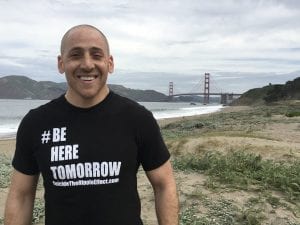
Kevin Hines, a suicide prevention activist, at the Golden Gate Bridge in San Francisco, where he attempted suicide in 2000.
“We want to inspire each person to bring that knowledge and compassion and awareness to other people they interact with.” September is National Suicide Prevention Awareness Month.
Hines this summer responded to DeGreve and asked her to come on his podcast in July. She kept in touch with him, and his wife asked her to speak at Saturday’s event. Another keynote is Robin Williams’ son, Zak. The beloved comedian and film star, Williams took his own life in 2014 at age 63, after struggling with Lewy body dementia.
Kevin Atwood, founder of Foster’s Voice — Suicide Awareness (recently surpassing 10,000 followers on Facebook), was the guest speaker of the first Gray Matters meeting, where 200 people braved an ice storm to attend.
“I didn’t know what it was and Foster’s Voice was just starting to really reach the community,” he has said. “I had a brief conversation with this beautiful, intelligent, compassionate young lady about mental health and I knew I wanted to help her any way I could. I believe that we must reach our youth to make an impact and the type of change that is needed in our country surrounding mental health and suicide because they are the future.
“Let’s be honest, they have the opportunity now to make the difference or to continue on the path of rising suicide rates and mental illnesses closeted because of the stigma surrounding it,” Atwood said. “Foster’s Voice has been a part of every Gray Matters event and is a huge supporter of what Haley has done on campus.
“Haley is an incredible and very unique person,” he added. “She is so very compassionate, loving and dedicated to making a difference in mental health. So much so that we were honored to add her to the team at Foster’s Voice to help my Foster reach more people and continue
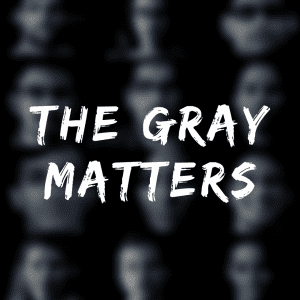
The Gray Matters Collective launched at Augustana in January 2019.
to grow in his mission. She works every day to make the world a better place for those who struggle. I believe in her, I believe in her abilities and I believe she will be a leading advocate for mental health in our country.”
Foster’s Voice was founded to honor his son Foster, a 2016 United Township High graduate who planned to be a police officer, and took his own life at 19, in July 2017.
“We’re here to help other people, so other people don’t make the same tragic mistake,” Atwood (who has three other kids with his wife Jaime) has said.
“It’s stealing our youth,” he said of suicide. “Think about the future my son could have held. It affects our communities; it affects the world. That’s why we’re here to change it.”
Heightened concern during Covid
Public health groups like the Centers for Disease Control, Prevention’s Morbidity and Mortality Weekly Report and World Health Organization all point out that mental health is “languishing” and “issued warnings about the possible effects of Covid-19 on suicidal behaviors,” according to a recent Forbes article.
The organizations said, “Mental health consequences are likely to be present for longer and peak later than the actual pandemic. Suicide is likely to become a more pressing concern, as the pandemic spreads and has longer-term effects on the general population, the economy and vulnerable groups.”
U.S. News & World Report detailed the story of Dr. Lorna Breen, a 49-year-old emergency room doctor in New York City. Dr. Breen, during the early stages of the outbreak, worked 18-hour days and was “sleeping in hospital hallways.”
She contracted Covid-19 and took time off from work. When she returned, Dr. Breen suffered from exhaustion and her family asked her to return home to recuperate back in Virginia. Her father said she “seemed detached.” She had told her dad that “she was also deeply disturbed after witnessing so much death and suffering of patients,” and died from suicide in April.
“The mass media stokes up fear, hate and racial tensions on an hourly basis,” said the August Forbes piece. “Over 55 million people have filed for unemployment benefits since the start of the outbreak. People are afraid that they’ll lose their jobs, won’t be called back from being furloughed or wonder if their company will still be solvent.”
The number of U.S. Covid deaths this week surpassed 200,000 (with over 6.9 million testing positive for the virus). The CDC conducted a survey of 5,412 people June 24 to 30 and the collected data on suicides is alarming, Forbes said.
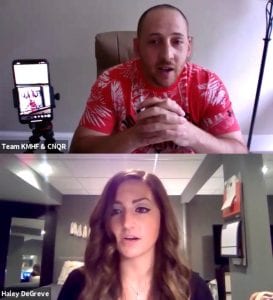
DeGreve spoke with Kevin Hines on his podcast in July.
Roughly 25 percent of young adults between 18 and 24 say they’ve considered suicide because of the pandemic. About 30.9% of respondents said that they “had symptoms of anxiety or depression” and about 26.3% reported trauma and stress-related disorders caused by the outbreak. Over 13% said that they have used alcohol, prescription and/or illegal drugs to deal with their pandemic-induced stress and anxiety.
As it relates to young adults, Dr. Robert Redfield, director of the CDC, said, “We’re seeing, sadly, far greater suicides now than we are deaths from [Covid-19].” Even before Covid, suicide has been the second-leading cause of death for all Americans age 10-34, according to the American Foundation for Suicide Prevention.
Cook County, Illinois Board President Toni Preckwinkle has reported that more African-Americans in her county “have died by suicide this year than during all of 2019.” She has said, “2020 is on pace to be the worst year for suicides in the Black community in a decade.”
“There’s a lot of awareness in this month of September, but come October, they’re going to forget about it,” DeGreve said Tuesday. “Mental health is never talked about, and suicide is the second-leading cause of death in children 10 to 24. It’s the second-leading cause of death and it’s the most preventable, so why aren’t we talking about this. On the other end of it, we’re seeing a spike in black youth suicide, which is devastating and that’s not talked about.”
“There are so many issues going now, it’s difficult to focus on one,” she said. “What can we do to come together, and tell each other it’s OK to not be OK now, given the circumstances of our world?”
“I’ve been crazy busy this month for Suicide Prevention Month, and I have some really big speaking engagements coming up that I am beyond thrilled about,” DeGreve said. “The one this weekend is my biggest audience yet, and I’m a little nervous about it.”
“When you’re a mental health advocate and someone who fights for suicide prevention every day, the month of September can almost be a little frustrating, because you see the outpouring of love from the community during this month, but then it’s like once October rolls around, it seems like it dies down.”
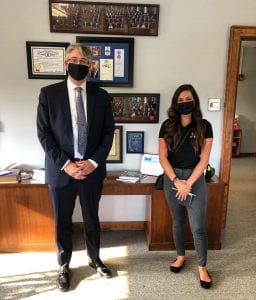
DeGreve meeting with Illinois state Rep. Mike Halpin (D-Rock Island).
“Suicide prevention day for me is every day,” she said. “Sometimes, it can be a little frustrating. But it’s such amazing awareness work, and it’s necessary to get the word out. Last year, was really the first month I had been doing a lot of advocacy work with the Gray Matters, then Foster’s Voice. I had participated in a few speaking engagements.”
DeGreve is the social media manager for Foster’s Voice, and leads Facebook Live events for the group every other Wednesday.
“But this year seems like it’s a lot different, because I think with the pandemic happening, Covid, racial tensions in our country; a lot of different things that have happened in 2020, I think people are really suffering,” she said. “I can tell from the messages I receive through the Gray Matters, it seems like a lot of people are struggling more.
“I also believe with everything going virtual, people have just been putting out a ton of content and doing a lot more mental health panels,” she said. “It’s been great to be a part of that, but it’s busy right now.”
Many people are struggling with not being able to meet in person, like in support groups, DeGreve said.
“Community is something that can really help people feel supported and encouraged when they’re suffering, and right now, when all that’s not there anymore, I think it causes people to have a little bit of a breakdown in recognizing you can’t always see your family and friends,” she said. “I think people are trying to reach out virtually as much as possible, to try and get a sense of community and stay connected.”
Some small support groups continue to meet in person (masked and socially distant), with larger groups online, DeGreve said.
“Still being able to have the ability to participate in discussions like this in the virtual realm is good,” she said. “I also am a huge advocate for having that face-to-face interpersonal interaction. I think people really need that.”
Gray Matters to get political
Gray Matters is looking at expanding in the Q-C and beyond, to the national level. They have a #Ok2NotBeOk social-media campaign this month, which has gained a lot of followers.
“People have found a lot of peace and hope in our movement, which is what the full intention is,” DeGreve said. “Right now, we have our Augie chapter still going. But on my end, I’m doing more stuff in the community with the Gray Matters. We’re looking to promote as much positivity as we can through social media. We’re also working on a website, we can create a central hub for information.”
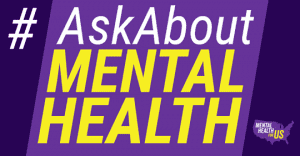
There’s a campaign for people to ask presidential debate moderators to ask about mental health, starting with the first Sept. 29 debate.
One goal for Gray Matters is to get more political on the state and federal level, to drive action and change, she said. DeGreve met with Illinois Rep. Mike Halpin (D-Rock Island) Monday to talk about bills on mental health.
“We talked about funding and a lot of that conversation happens more on the federal level,” she said. “I would like to see the Gray Matters advocate for more funding. There are a lot of really good bills out now that have to do with suicide crisis situations, mental health awareness.”
One vital bill just got approved Monday by the U.S. House and Senate, for the National Suicide Hotline Designation Act, to go to the president for signing. The new 988 suicide prevention number won’t be available until 2022.
U.S. Rep. Chris Stewart (R-Utah) said: “This is a great day for our nation. Those who find themselves in a mental health crisis will now have the extra support that they need. I’ve met with many across Utah whose loved ones have taken their own life. I’ve heard their stories, I’ve heard their pleas for help, and today, I am proud that we are able to provide a vital resource to those who need it most.
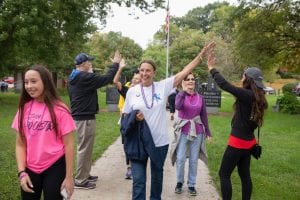
Participants in the 2019 Out of the Darkness Walk in Bettendorf.
“This easy-to-remember hotline will save lives and give us additional tools to help reverse the tragic trend of suicide. Every life matters and we can all do our part to prevent suicide by providing love and support to our neighbors who may be struggling.”
The Federal Communications Commission said that last year alone, counselors at 163 crisis centers around the country answered more than 2.2 million calls and more than 100,000 online chats.
Last December, the FCC voted to proceed with a proposal to set up a new hotline similar to 911 — only, instead of dialing the police, the number would connect callers to experts in suicide prevention and mental health. The number (988) would link callers to an already existing network of crisis centers around the country set up by the Department of Health and Human Services.
Currently, the hotline number is 1-800-273-8255 (TALK).
“There are so many people who are resistant to therapy and counseling, because there is such a stigma with it,” DeGreve said. “The hotline provides free, confidential, 24/7 service to people, that allows them to get through their suicidal moments.”
“Transitioning to the three-digit 988 is meaningful in two ways. One, it shows on the national level that suicide is becoming more of a priority,” she said. “A lot of officials have finally been standing up, this suicide number going to 988 is just as important as 911. That suicide crisis is just as important as any other crisis in our country.
“On the other hand, it’s important because when you are in a suicidal moment, you aren’t going to probably remember the suicide hotline number,” DeGreve said. “There were times I wanted to call the number and didn’t remember it. People say you can just Google it. It’s almost intimidating to do that, especially when you’re in such a moment where asking for help seems so far away and help is not within reach, that it just doesn’t come to your mind right away.”
“Having the 988 number is going to be easy to advocate for and going to help people in those crisis moments to remember, right away, 988,
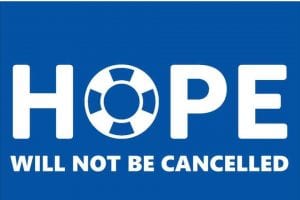
An inspirational message from AFSP.
instead of 1-800-273-8255,” she said. “It’s one of those moments that’s literally life or death and that person doesn’t have a phone on them and you’re helping them and you don’t really know a lot about mental health or suicide prevention. It would be so much easier if we could just have that 988 number become normal.”
There has been no discussion of mental health during the presidential campaign, aside from Democrats’ worry about the Affordable Care Act being repealed.
“This is something I talked with Rep. Halpin about – that exact fear of losing funding for mental health services and suicide prevention,” DeGreve said. “I’m also worried about just what’s going to happen in this election overall. There’s a strong agenda on both sides, and I’m worried people aren’t seeing the problem. That’s my biggest concern, that this is an invisible pandemic in my eyes.”
Like the Black Lives Matter movement, with passionate protests nationwide this summer, DeGreve would like to see mass demonstrations for suicide prevention.
“At some point, I’d like to see something like that, where people could come together and use their voice,” she said. “That’s why with the Gray Matters, we’ve been trying to do that with the virtual program we have, to get people’s stories and voices out there.
“It’s difficult now, because we want to be mindful, not only of people’s mental health but physical health,” DeGreve said. “I think there would be a time and place once this (pandemic) is all over. This is the invisible pandemic that’s been happening, which now needs to be addressed.”
Preventing a pandemic and suicide epidemic
“Now with everything happening and the CDC director saying there’s been an upturn in overdoses; they’re seeing a lot more suicides, it’s very concerning for someone like myself who does fight suicide every day,” she said. “Sometimes, it feels like you’re not making a difference because you’re seeing all this stuff. But we just have to remember that you can save one person’s life by just saying, ‘Are you OK?’ and trying to be there in the best way you can.”
Covid deaths and suicide deaths are both preventable, DeGreve noted.
“I believe that there is some sort of parallel,” she said. “We can prevent the spread of Covid and we can prevent suicide. What it really comes down to, there needs to be a form of self-care but we also need to care about other people too. In a way, we’ve forgotten about that, ‘cause a lot of what’s happened this year has been so focused on physical health. We’re forgetting that people are struggling mentally and emotionally as well.”
“Go out of your way to make sure that people who aren’t physically around you anymore, to make sure they’re still doing OK,” she said. Being isolated in quarantine exacerbates the challenging situation.
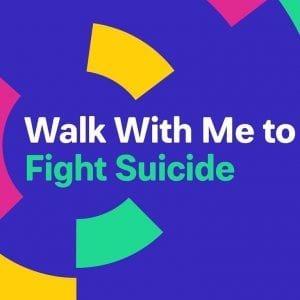
The annual Iowa Q-C walk for AFSP is this Sunday morning.
“I 100% believe that people being in isolation has not been beneficial for many people’s mental health,” DeGreve said. “Me personally, I struggled the first few months. I’ve kind of gotten into a routine now, but those first few months were rough. Not only just in the United States, but in our world overall, for the first time, we were focused to be with ourselves – our thoughts and feelings – 100 percent in isolation.
“A lot of people in our world have never had to do that,” she said. “When all these uncomfortable feelings, past traumas, mental illnesses are starting to form, be triggered, a lot of people have struggled with that.”
People who never had a mental health problem are struggling now because “they don’t have the excitement of the next vacation, or the next big holiday party – the big family events you would normally look forward to that you don’t have anymore,” DeGreve said. “Losing that excitement makes life feel very stagnant and boring, and when you’re in isolation, it can be really overwhelming.”
“That’s where the question comes in – is life really worth living, when you don’t have your friends around you?” she said. “That’s a question I think a lot of people have been struggling with.”
“Suicide prevention is about poverty, about unemployment; it’s about the race system, about people who are suffering with sexual identity,” DeGreve said. “There are so many different things that suicide covers, and almost every single one of those things have been hit hard this year and that’s what makes this problem so difficult to tackle.”
“There doesn’t seem like there are any real sustainable solutions right now, because everyone is so focused on Covid – we’re forgetting people who are out of a job, or are struggling with their depression more than ever before” she said. “How can we help them when we can’t be sitting next to them, comforting them?”
In less than two decades, 1999 to 2017, the U.S. suicide rate rose about 33%, according to a CDC report. Suicides among people 10 to 24 saw a steep 56% rise from 2007 to 2017.
From 2011 to mid-2018, there were 388 suicides in Rock Island, Scott and Henry counties.
Local “Out of the Darkness” walks
Jaime Atwood is chair of the annual Iowa Quad-Cities “Out of the Darkness” walk for the American Foundation for Suicide Prevention, which will be this Sunday both in person at Bettendorf’s Veterans Memorial Park, and for individuals virtually at their own pace.
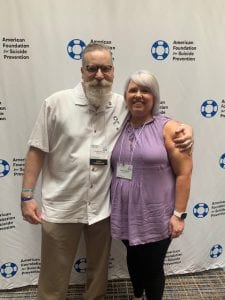
Kevin and Jaime Atwood in Washington, D.C., for the American Foundation for Suicide Prevention Advocacy Forum.
“We want the participant to do whatever they are comfortable with,” Atwood said this week. “So in preparation for that, I, along with a couple others will be at Veterans Memorial Park on Sunday from 8 a.m. to noon set up for Honor Bead and Resource pickup, Donation Drop Off, and the ability to purchase AFSP gear, as well as have the walk path marked in case anyone would like to come walk together in the park.”
The opening ceremonies and speakers will be posted on the Quad Cities – Iowa Out of the Darkness Facebook page at 8 a.m. After that, people are asked to walk either at the park or wherever they would like.
Everyone who participates can register for free at www.afsp.org/QUADCITIESIA. Anyone who donates or raises $150 or more will receive a free T-shirt. T-shirt pickup will be later this fall to allow and encourage participants to fundraise longer, Atwood said. Fundraising for the Out of the Darkness Walk ends Dec. 31.
“This walk is important to create awareness and honor the lives of the people we have lost to suicide. But now more than ever,” Atwood said.
“With the country going through an unprecedented time being quarantined, scared for their health, worried about their children’s education, about their businesses and employment, depression, anxiety and mental health has to be a serious concern and the statistics are proving it,” she said. “Unfortunately, we are just seeing the beginning. That’s what makes the message and mission that much more important.
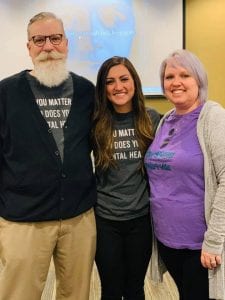
DeGreve with Kevin and Jaime Atwood.
As of Wednesday, nearly $7,000 had been raised toward a $15,000 goal.
Of DeGreve, Atwood said: “Haley is an absolutely amazing, compassionate person. I wish there were more young people with her passion and drive for changing the stigmas around mental health.”
Last Sunday, an AFSP walk for the Illinois Q-C took place at Len Brown’s North Shore Inn in Moline, raising $4,710 from 115 participants.
An award and a new job
Early this year, DeGreve earned the George Orley Student Mental Health Advocate Award from the University of Michigan Depression Center.
The $1,000 award – given to one Michigan student and another college student nationwide – was established by the Orley family after their son George (a Michigan student) lost his battle with depression in 2013, dying by suicide at age 20.
Due to Covid-19 travel restrictions, DeGreve was unable to accept the honor in person at an event scheduled for March in Ann Arbor. She’s been invited to the 2021 Depression on College Campuses Conference to receive it.
Covid also postponed the TEDxYouth program where she was to speak this spring at Davenport’s Putnam Museum. DeGreve will discuss suicide prevention at the rescheduled event March 28, 2021.
She spent about two years of her time at Augie as a communications student intern at John Deere Worldwide Parts, at its Parts Distribution Center in Milan. She’s been working for Deere remotely since March, and since July in a new job with dealer parts management.
“Deere has been taking it really seriously,” DeGreve said of the virus. “They even, this summer, sent a care package to employees, with mental health resources in it. That made me really proud; they’ve taken a lot of precautions when it comes to physical health, but it seems, but they’re paying attention to mental well-being, too.”













Leave a Reply
You must be logged in to post a comment.